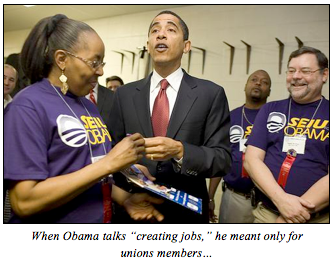One year ago this past Saturday President Obama signed an executive order that reshapes the bidding process for federal construction projects in a manner that is heavily weighted in favor of unionized companies.
This was done as a sop to labor bosses who have thus far failed to win passage of The Employee Free Choice Act (EFCA), despite large Democratic majorities in both congressional chambers. Free market groups have vigorously opposed the card check and binding arbitration components of the bill, which they argue would further burden business in a challenging economic climate.
The executive order signed on Feb. 6, 2009 calls for project labor agreements (PLAs) to be used when the cost to the federal government exceeds $25 million. PLA’s are set up as multi-employer, multi-union, pre-existing agreements designed to harmonize labor relations between construction trade unions and contractors.
Nationwide about 16 percent of the nation’s private construction workforce is unionized. This means PLAs could be used to discriminate against the more than eight of out of 10 construction workers who are not part of a union, as some critics have observed.
In his analysis of the order, Maurice Baskin, the legal counsel for Associated Builders and Contractors (ABC), wrote:
“The Order will result in widespread discrimination against the many construction workers who do not belong to unions, and denies their right to Freedom of Association and Equal Protection. The Order will cause money to be unfairly taken from such workers and funneled into under-funded union pension plans, from which the workers can receive no benefits. The Order will increase costs to the federal taxpayers by arbitrarily limiting competition for federal construction work.”
But PLAs would actually open the way to greater efficiency and diffuse labor disputes, President Obama maintains in his order.
“The use of a project labor agreement may prevent these problems from developing by providing structure and stability to large-scale construction projects, thereby promoting the efficient and expeditious completion of federal construction contracts, the order says. “Accordingly, it is the policy of the federal government to encourage executive agencies to consider requiring the use of project labor agreements in connection with large-scale construction projects in order to promote economy and efficiency in federal procurement.”
As the U.S. Senate prepares to vote on the nomination of a labor nominee who favors administrative action over congressional approval, it is worth examining how the president has oriented himself in light of legislative setbacks.
Craig Becker, a general counsel to the Service Employees International Union (SEIU) and the AFL-CIO could possibly be confirmed as soon as Monday. In his academic writings, he has argued in favor of securing major policy changes through non-legislative means.
The year-old PLA order, which has received very little press attention, demonstrates that the administration is working to advance paybacks to union bosses in much the same spirit that Becker has suggested.
Obama’s maneuvering comes at a disconcerting moment for organized labor. For first time in American history, most union members now work for the government, according to the Bureau of Labor Statistics (BLS). As it is, only about 8 percent of private sector employees are members of unions.
PLA opponents suspect that construction unions are now pushing for these agreements as a way to reinvigorate their depleted ranks and to bolster their underfunded pension plans. ABC officials have a detailed explanation of the likely motivations.
But the final word on PLAs could be delayed until after the mid-term elections. Obama and his congressional allies have run into unexpected opposition as the final rule on implementation of the EO has yet to be written. The Department of Labor (DOL) was forced to pull back on a PLA in New Hampshire last year when North Branch Construction, a Concord, N.H.-based general contractor and ABC member, filed a bid protest claiming the PLA restricted competition.
“This was the first time a PLA done under the new executive order and they [the administration] made several mistakes here,” said Brett McMahon vice-president of Miller and Long, a Maryland-based concrete construction company.
“They declared in the procurement document that you had to have done three PLA projects in order to qualify, which makes no sense because that says nothing about your capabilities as builder and it says that in practice union companies could bid.”
Moreover, the General Services Administration (GSA) did not have any clear guidelines with regard to PLAs, since the Federal Acquisition Regulation (FAR) agency has not issued any final rulings, he continued.
“So they basically jumped the gun before any final ruling came out and DOL decided to cancel the project instead of setting a bad precedent,” said McMahon, who is also an ABC member.
But PLAs remain in motion in at least three sites in Washington D.C. and in other states. A complete list can be found here.
If Obama succeeds in pushing through PLAs, they will come at the expense of American taxpayers and the larger workforce, according to a new study from the Beacon Hill Institute (BHI) shows that PLAs would increase construction costs anywhere between 12 and 18 percent in comparison to projects that are not subjected to union rules.
Other pro-union executive orders remain in force including one that rescinds requirements for workers to be informed of their right not to pay a portion of union dues to political activity they do not support.
Suddenly, the left seems keen on the idea executive power activity unfettered by popular consent.


